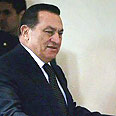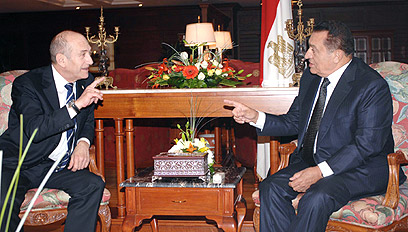
Mubarak hints: We’ll develop nukes
During summit with Prime Minister Ehud Olmert, Egyptian president hints that if Iran attains nukes, Egypt will have to also in order to defend itself. Up until now Egypt has claimed its nuclear program was for energy purposes only
“We don’t want nuclear weapons,” Mubarak stated, “But since they appear highly present in the area, we must defend ourselves."
Recently Egypt announced that it was striving to attain nuclear capabilities. President Mubarak himself, as well as his son Jamal, were questioned on the issue and declared that their nation needed nuclear energy for peaceful purposes, and Egypt's nuclear program would be aimed at overcoming the deficiency in fuel and natural gas reserves.
However, now it appears that if Iran develops nuclear power, Egypt will no longer be satisfied with devoting its nuclear resources to peaceful purposes alone.
Regional armament
Mubarak made the comments Thursday after being questioned by an Egyptian journalist on Olmert’s recent “slip of the tongue” regarding Israel’s nuclear armament. The writer asked whether Olmert’s peaceful declarations during their meeting contradicted his recent comments in Germany that Israel is stocked with nukes.

Olmert, Mubarak in Sharm e-Sheikh (Photo: Amos Ben Gershom, GPO)
In response, Olmert reiterated past statements that “Israel will not be the first to introduce nuclear weapons to the Middle East. As is well known, it is Iran that is threatening to introduce nukes and use them – and many countries have good reason to be concerned, including Israel, Egypt and many European nations. The UN Security Council’s decision to threaten sanctions against Iran is a step in the right direction.”
Mubarak, on the other hand, said that if Iran attains nuclear weapons, his country cannot sit idly by on the sidelines. “Egypt’s stance is clear. We declared this stance in Baghdad in the early 1990’s in the presence of then President Saddam Hussein: The Middle East should be free of weapons of mass destruction – atomic, biological and chemical.
“We don’t want nuclear arms in the area but we are obligated to defend ourselves. We will have to have the appropriate weapons. It is irrational that we sit and watch from the sidelines when we might be attacked at any moment,” Mubarak stated.
Under shadow of violence
The meeting between the two leaders took place in the shadow of Israel’s operation in Ramallah in which six Palestinians were killed. The military incident weighed on the friendly meeting, and at the press conference Mubarak did not hide his chagrin over the Ramallah killings.
“I informed the prime minister of my grave concern over the operation in Ramallah today. I stressed the need to avoid (such incidents) to bring peace and calm if we are serious in our intentions to aim for peace,” he said.
“Israel will not achieve security unless it halts all the operations which are holding up the peace process,” Mubarak added.
Olmert for his part expressed his regrets over the incident. “I am sorry if innocent people in Ramallah were hurt but it must be remembered that Israel must take preemptive steps to prevent terrorists from attacking Israel, and today’s operation was aimed at terrorists who murdered innocent (Israelis). During the operation the IDF came under fire and devolved unpredictably. We had no intentions to harm innocent victims,” he said.










